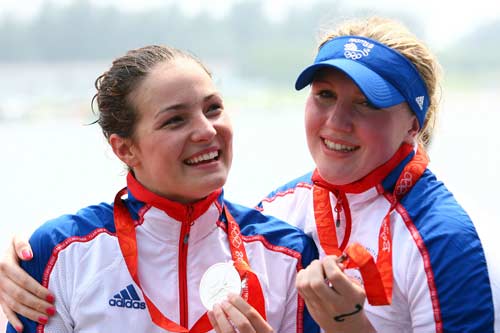Double delight for Britons caught up in 'fight in a lake'

Your support helps us to tell the story
From reproductive rights to climate change to Big Tech, The Independent is on the ground when the story is developing. Whether it's investigating the financials of Elon Musk's pro-Trump PAC or producing our latest documentary, 'The A Word', which shines a light on the American women fighting for reproductive rights, we know how important it is to parse out the facts from the messaging.
At such a critical moment in US history, we need reporters on the ground. Your donation allows us to keep sending journalists to speak to both sides of the story.
The Independent is trusted by Americans across the entire political spectrum. And unlike many other quality news outlets, we choose not to lock Americans out of our reporting and analysis with paywalls. We believe quality journalism should be available to everyone, paid for by those who can afford it.
Your support makes all the difference.It was officially called the 10km open water race but in reality it was the inaugural women's 10km Fight in a Lake. And Britain's Keri-Anne Payne and Cassie Patten can take immense satisfaction from the respective silver and bronze medals they won here at the Shunyi Rowing-Canoeing Park today after an enthralling and historic contest.
This was a first appearance on the Olympic schedule for an open water swim, aside from in a triathlon. Swimming's world governing body, Fina, allows it to be swum in lakes, rivers, canals or in the sea, and the Chinese picked the kindest option, four laps of the calm rowing course.
This particular 10km made double history because it featured South Africa's Natalie Du Toit, the first amputee to take part in a Games event.
In the closest of finishes, Russia's Larisa Ilchenko - the world champion and pre-Games hot favourite - swam a tactically perfect race, tracking the pace-setting pair then sprinting past the Britons only in the final yards. That has been Ilchenko's trademark in an event she has dominated for years.
Her winning time was 1hr 59min 27.7sec, just 1.5sec ahead of Payne, 20, who ended up less than two seconds ahead of Patten, 21. The Britons are team-mates at Stockport Metro, training partners and best friends.
If there was a blot on the morning then it came in the shape of the dirty sub-surface scuffle at the end. Patten had her limbs pulled during the run-in by a rival, Germany's Angela Maurer. The poetic justice was that Maurer could finish no better than fourth, although Patten might have bettered third if she had not been hindered.
“I had my legs pulled,” said Patten. “I'm just annoyed because I didn't get to savour looking up and coming in third because of that. It's unsportsmanlike. I would never pull on someone's legs so I would never assume someone would do it to me.” Holding up her medal, she added: “But at the end of the day, I've got one of these and she hasn't, so that's enough ... I don't want to start an inter-country war.”
Maurer said: “It was really crowded going around the corners. There was a lot of grabbing and pulling, but I have to say I was no angel either.”
With Payne being hindered by weeds in her costume and in her face, and Patten at one point swimming straight into a marker buoy, the event was reminiscent of another 10km full of hazards and argy-bargy last year. On that occasion, at the world championships in Melbourne, Ilchenkno won with Patten in second place, but the whole field were attacked by jellyfish. Payne was stung in the mouth, received treatment mid-race and finished 11th. And Maurer, who then finished fourth, was shocked by the ferocity of the competition. At the time, she said: “Everyone was just beating each other up. I have never experienced such a race before. It was horrible." She has evidently toughened up since.
Payne and Patten had no tactical plan but swam side by side throughout. “We're best friends, we train together and we just kind of knew when to kick at the right time,” said Payne, who looked almost as fresh at the end as at the beginning. “It's amazing what a silver medal can do for you,” she said.
Patten was hurting more, and not just because of her buoy crash, a cut leg and the scrap. “Every part of your body hurts,” she said. “Your stomach is the size of a pea, because all the blood rushes to your arms. Your body is saying stop but your head is saying 'Come on, keep going.' The last kilometre felt like 20km. Every time I looked up the finish seemed no closer.”
Du Toit, 24, was a promising young swimmer with an Olympic future when her motorbike collided with a car in 2001. She sustained massive injuries to her left leg, which was amputated at the knee a week later. Instead of giving up her sport, she became a noted Paralympian and also made every effort to compete against able-bodied athletes.
But starts and turns in a pool require two legs to be truly competitive. Open water swimming does not demand the same skills, and upper-body strength becomes a particular asset. “When I take my [prosthetic] leg off, I'm completely free in the water," Du Toit said. “That's who I am.”
She said she was disappointed with a 16th-place finish (of 24 starters) but added: “I tried my best. I'm not too happy with it, but I'll be back for 2012 ... You have to set dreams, set goals and never give up.”
Patten said: “I find this event hard, and I'm a completely able-bodied person.”
Join our commenting forum
Join thought-provoking conversations, follow other Independent readers and see their replies
Comments